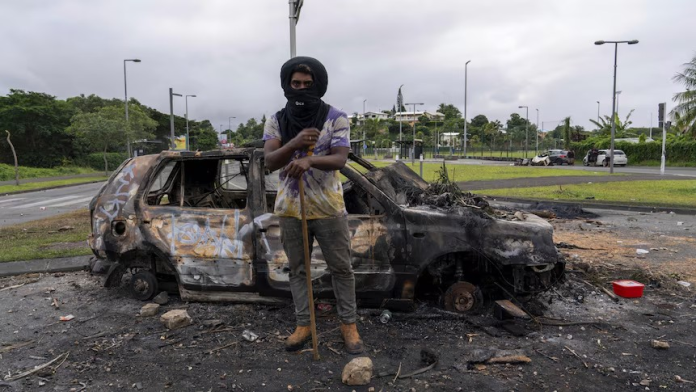Electoral reforms have sparked unrest, but New Caledonia’s Kanaks say they are fighting to correct years of growing inequality, The Guardian reports.
Demonstrations in New Caledonia began on May 13 and were sparked by voting reforms proposed by the French parliament. Looting, arson and clashes have left six people dead, hundreds injured and extensive damage. The riots come amid deep concerns about inequality and New Caledonia’s long-standing efforts to achieve independence.
A 52-year-old indigenous Kanak, who gave his name as Mike, said:
The voice of local Kanaks is not being listened to.
Macron’s rushed visit was, even in the words of his own advisers, “double or quits … a bet”.
But while he sought meetings between politicians and recognised that inequality had increased, his language was also telling. Macron said:
The return of republican order is the priority.
He left New Caledonia after 18 hours on the ground, promising that the reforms that would give voting rights to tens of thousands of non-Indigenous residents would not be pushed through by force, but the situation would be reviewed again within a month.
Kanak protesters disappointed by Macron’s words
On the roadblocks, protesters say a delay is not enough, and that the reforms should be withdrawn. One protester said on Friday from a roadblock:
The statements of president Macron are disappointing. We are exactly at the same point. He continues to let the situation deteriorate without making a strong gesture to calm things down.
Activist Jean-Pierre Xowie, a member of pro-independence FLNKS, told French television from New Caledonia ahead of the presidential visit:
The solution won’t come from the state, it will come from the Caledonians.
Macron has said security forces will stay there as long as necessary. But FNKS spokesman Jimmy Nauna insists that the presence of French security forces – more than 3,000 are now on the ground, mostly in and around Nouméa – only serves to inflame the situation. He also said:
You can’t keep sending in troops just to quell the protests, because that is just going to lead to more protests. By deploying the army, what are we doing here? This is not a war-torn country. We are not terrorists, as they say.
Naouna said New Caledonia’s current conflagration was a “political situation so there needs to be a political solution”.
Kanaks’ anger at the state is not limited to the issue of electoral reform. At the barricades that have grown up all over the territory, blocking major roads and infrastructure, activists make it clear that these protests have both economic and social aspects.
Young people ready to fight
Lélé, a 41-year-old activist living in New Caledonia, said:
The Kanak are not being recognised for their true worth, they want a fair redistribution of wealth. What we ask of Macron is to recognise the legitimacy of the Kanak.
Many Kanaks do not condone the recent violence, but just as many understand the anger of frustrated youth. Djamil, who is married to a Kanak woman and sympathises with the independence movement, said:
We hear young people saying they are ready to die at the checkpoints … That shows how deeply they are affected in their dignity. Macron is stuck in his opinions. He hasn’t really taken the true measure of what is happening … He made a big mistake by letting the country get bogged down.
For the French president, the proposed electoral reform bill was a paramount issue, but the island territory is characterised by deep inequalities: according to the 2019 census, the poverty rate among indigenous Kanaks, the largest community, is 32.5%, compared to 9% among non-Kanaks.
These disparities are even more pronounced in education and employment statistics. Only 8% of Kanaks have a college degree and 46% do not have a high school diploma. At the same time, 54% of people of European descent have a tertiary education, and this proportion drops to 24% among people of mixed descent, the 2019 census shows.
In an apparent reference to past efforts to expand opportunities, Macron said on Thursday that “the rebalancing has not reduced economic and social inequalities, but has even increased them.”
A long-standing dispute over independence
A broader impasse remains the contested independence process for New Caledonia.
In the 2018-2021 referendums, a majority of voters opted for New Caledonia to remain part of France rather than supporting independence. The pro-independence movement rejected the results of the last referendum held in 2021, which they boycotted on the grounds that it was held in the midst of a coronavirus pandemic. The movement urged Kanaks not to vote. It argued that Covid made it impossible to campaign for independence because entire villages were observing normal mourning rituals.
Three referendums have been held under the Nouméa Agreement concluded with France in 1998, and a third referendum, in 2021, is likely to finalise the process. The previous independence referendum, held in 1987, also failed.
Under the 1998 agreement, new arrivals to New Caledonia were barred from voting in order to maximise the Kanak vote. After the referendums were finalised, the French government finally granted voting rights to long-term overseas natives.
Nevertheless, many Kanaks in New Caledonia continue to favour independence. Axel, 21, who defines himself as a child of Kanaks, noted:
Macron is welcome, but he is not our president.
